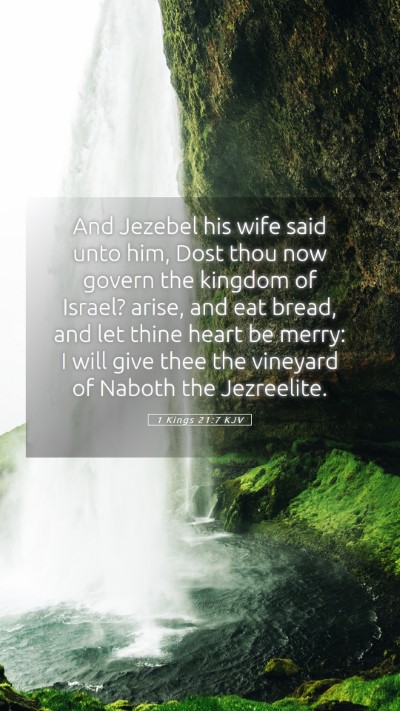Understanding 1 Kings 21:7: A Comprehensive Commentary
The verse in question, 1 Kings 21:7, depicts a pivotal moment in the narrative related to King Ahab and Naboth. The response of Ahab's wife, Jezebel, significantly impacts the plot and illustrates themes of power, manipulation, and moral corruption.
Context of the Verse
This verse is set against the backdrop of Ahab's desire to acquire Naboth's vineyard. It highlights not only his greed but also the manipulative nature of Jezebel, who ultimately orchestrates Naboth's demise to fulfill Ahab's wishes. Understanding this passage requires a grasp of the historical and cultural context of the time.
Biblical Exegesis and Verse Meaning
In 1 Kings 21:7, Jezebel speaks to Ahab, indicating her willingness to go to great lengths to gain what he desires:
"And Jezebel his wife said unto him, Dost thou now govern the kingdom of Israel? Arise, and eat bread, and let thine heart be merry: I will give thee the vineyard of Naboth the Jezreelite."
Commentary Insights
-
Matthew Henry's Commentary:
Henry points out the audacity of Jezebel's proposition, revealing her character as domineering and unscrupulous. Her actions serve to illustrate the dangers of unchecked power, especially in the hands of those like Ahab and Jezebel who prioritize personal gain over justice.
-
Albert Barnes' Notes:
Barnes emphasizes the need to recognize Ahab's passive role and Jezebel's active manipulation. He illustrates how this incident precedes the ultimate judgment against her actions, pointing to God's disapproval of such tyranny and injustice.
-
Adam Clarke's Commentary:
Clarke delves into the moral implications of the verse, stressing that Jezebel's words reveal a lack of regard for sacred principles, showcasing how tyranny can coexist with apparent devotion to leadership. Jezebel's readiness to deceive and murder embodies the antithesis of godly leadership.
Moral and Theological Implications
The actions of Jezebel invite reflection on the nature of leadership and moral compromise in the pursuit of personal desires. This text serves as a warning against the perils of allowing power to eclipse ethical considerations.
Application to Daily Life
For modern readers, 1 Kings 21:7 can serve as a cautionary tale regarding the manipulation of circumstances for personal gain. It strengthens our understanding of the importance of integrity and the consequences of actions driven by greed.
Related Scripture Cross-References
- James 4:2-3: Highlights the conflicts that arise from selfish desires.
- Micah 2:1-2: Speaks against coveting and the exploitation of others.
- Exodus 20:17: Addresses the commandment against coveting one’s neighbor’s possessions, mirroring the heart of Ahab's desire for Naboth's vineyard.
Conclusion
The verse 1 Kings 21:7 provides an insightful look into the dynamics of power and morality within leadership roles in the biblical narrative. By studying this passage and its context, individuals can gain a deeper understanding of God's law regarding justice and integrity, as well as the social responsibilities of those in positions of authority.


